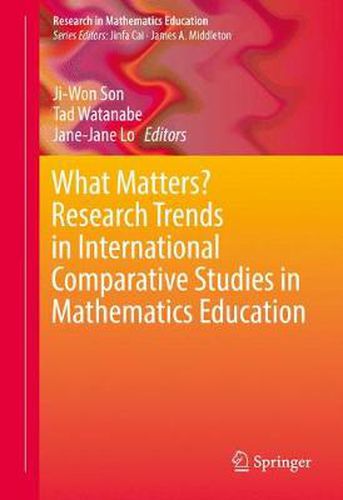Readings Newsletter
Become a Readings Member to make your shopping experience even easier.
Sign in or sign up for free!
You’re not far away from qualifying for FREE standard shipping within Australia
You’ve qualified for FREE standard shipping within Australia
The cart is loading…






This book provides a unique international comparative perspective on diverse issues and practices in mathematics education between and among the US and five high-performing TIMSS education systems, Japan, China, Singapore, South Korea, and Taiwan. The book offers multiple perspectives on the important factors that contribute to mathematics teaching and learning in different educational systems and cultural contexts. Using large scale data generated by numerous international comparative studies, the book analyzes and provides context for various methodological perspectives.
The book raises compelling questions and issues for mathematics education researchers, leading to a critical examination of what can be learned from other education systems. Authors address four major research perspectives by critically examining cross-national similarities and differences, such as research on the influence of curriculum on student learning; research on institutional systems of mathematics teacher education; research on improving teacher knowledge and pedagogical approaches; and research using large-scale data. This collection of perspectives serves as a foundation for reviewing and analyzing the international comparative studies introduced in the book.
$9.00 standard shipping within Australia
FREE standard shipping within Australia for orders over $100.00
Express & International shipping calculated at checkout
This book provides a unique international comparative perspective on diverse issues and practices in mathematics education between and among the US and five high-performing TIMSS education systems, Japan, China, Singapore, South Korea, and Taiwan. The book offers multiple perspectives on the important factors that contribute to mathematics teaching and learning in different educational systems and cultural contexts. Using large scale data generated by numerous international comparative studies, the book analyzes and provides context for various methodological perspectives.
The book raises compelling questions and issues for mathematics education researchers, leading to a critical examination of what can be learned from other education systems. Authors address four major research perspectives by critically examining cross-national similarities and differences, such as research on the influence of curriculum on student learning; research on institutional systems of mathematics teacher education; research on improving teacher knowledge and pedagogical approaches; and research using large-scale data. This collection of perspectives serves as a foundation for reviewing and analyzing the international comparative studies introduced in the book.